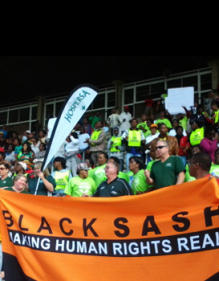|
Getting your Trinity Audio player ready...
|
 By Valencia Talane
By Valencia Talane
A countrywide campaign focused on stopping illegal debt deductions from social grant beneficiaries’ accounts is underway.
Human rights NGO Black Sash is driving the Hands off the Social Grants campaign, which was prompted by a growing number of grant recipients lodging complaints with the South African Social Services Agency (Sassa) because money was deducted before vit even reached their accounts. For taking the initiative to intervene in the potential abuse of the grant system, Black Sash is the hero of the week.
Hands off the Social Grants aims to understand how the different types of deductions for loans, airtime, electricity and other goods, occur. According to social assistance legislation, Sassa can only deduct a maximum of 10% for funeral policies. The rest of the grant amount must be paid out in full to the beneficiaries.
A report by Groundup states that Black Sash’s work on the investigative project started in 2012, when the organisation launched a pilot project in the Western Cape and Eastern Cape, surveying grant beneficiaries to ascertain the standard of the service by Sassa. Through this research, Black Sash discovered that several beneficiaries could not account for deductions that were made from their accounts, with Sassa admitting that they have noted several hundred complaints regarding the matter.
For Esme Pamplin, a 65-year-old beneficiary and resident of Heideveld in Cape Town, deductions made from her grant of R1 350 a month are a heavy burden on her family. She first noticed a discrepancy in February this year, when more than R100 had been deducted from her account for electricity and airtime. The deductions have not only forced Pamplin’s family to cut back on essential goods, but have also negatively impacted her well-being, Groundup reports.
The provision of social grants, although viewed as a working system that helps provide a poverty safety net for millions of unemployed South Africans, has not been without its share of controversies.
Earlier this year, Corruption Watch appeared as a friend of the Constitutional Court in a R10-billion tender dispute between AllPay Consolidated Investments Holdings and others v Sassa and others. The case had been brought before the court by Allpay, a losing bidder in a tender to provide the social grants, which disputed the awarding of the contract by Sassa to Cash Paymaster Services. The court ruled in favour of Allpay, declaring the contract unlawful.
The submissions of Corruption Watch focused on the need to protect and uphold the rule of law. The organisation further called on the South African Police Service to take on the case and investigate the tender process.
Welcoming the Constitutional Court’s judgment, Corruption Watch executive director David Lewis said he was pleased that the court had accepted and referred to Corruption Watch’s submissions in its decision.
Sassa was ordered by the court to initiate a new tender process for the payment of social grants after finding that the agency had committed serious irregularities in the process of awarding the tender.
Responding to questions on the unexplained deductions, Sassa acting head of communications Moabi Pitsi said over the past two years, Sassa has run public awareness and educational campaigns through advertisements on the radio and in newspapers, and at workshops country-wide.
“There is a procedure that beneficiaries follow once there are signs of unlawful debt deductions. It includes investigating each case and finding ways to resolve that matter,” he said.



